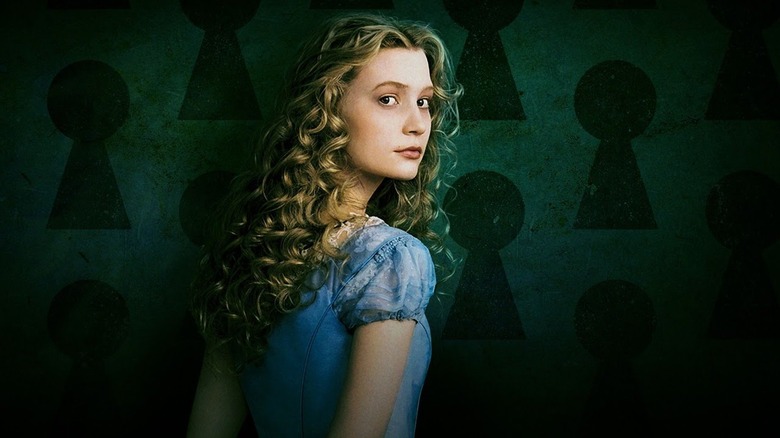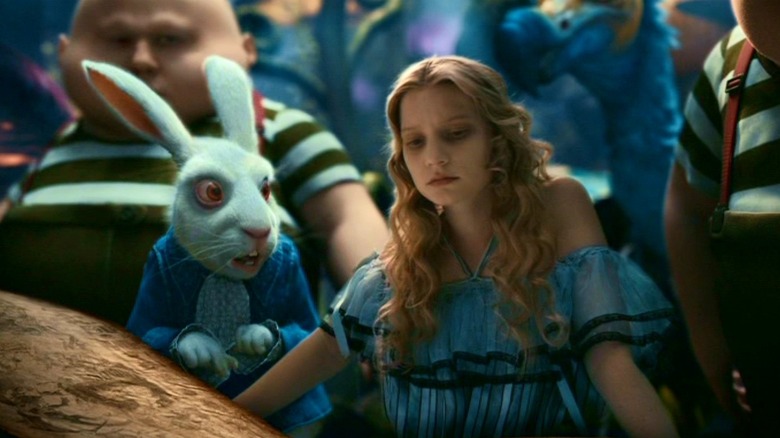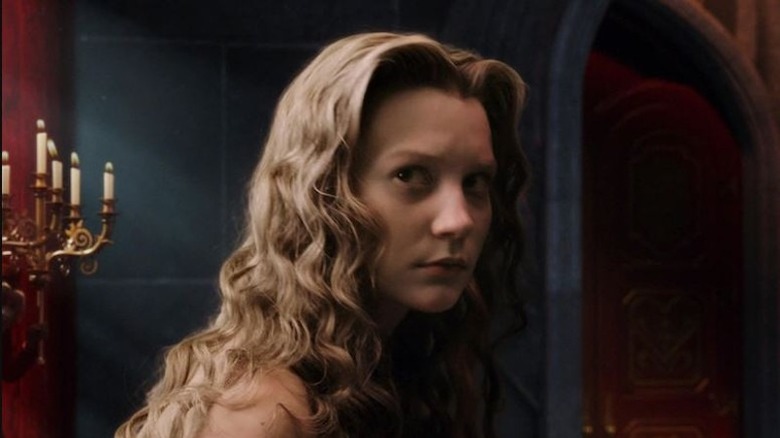Tim Burton's Take On Alice In Wonderland Was Fueled By A Hatred For The Titular Character
In Tim Burton's "Alice in Wonderland," we follow an aged-up Alice Kingsleigh (Mia Wasikowska). At the age of 19, Alice has entered polite London society and is expected to take on duties associated with her womanhood. At a party thrown to celebrate the engagement between her and her fiance, she spies a white rabbit. Like any of us would, she follows it and ends up falling down a hole after him. Thus, she finds herself back in the magical land of Underland, a place that she thought had been a dream, but in reality, she had visited when she was a little girl. Now forced to confront her destiny, Alice has to restore Underland before its too late.
The character of Alice has been a source of creative inspiration since her original debut. First introduced to the world in Lewis Carroll's "Alice's Adventures in Wonderland," Alice has captured the hearts of many over the decades, so much so that the children's novel has yet to go out of print. But not everyone has warmed up to the character.
In fact, during the press tour for his interpretation of "Alice in Wonderland," director Tim Burton owned up to his dislike of the character. The idea of anyone hating the beloved Alice seems so incredibly farfetched. But if anyone was going to be the odd duckling out on the Alice fan train, it would be Burton, and it all boiled down to making her relatable for him.
'An annoying, odd little girl'
Tim Burton is no stranger to adaptations and re-imaginings. He's taken on Batman, Roald Dahl's "Charlie and the Chocolate Factory," and more. However, when it came to tackling the story of "Alice in Wonderland," things started off on oddly given his hatred of the titular character. As he explained to The Guardian, he's never been fond of how the character has been depicted in television and film. "She's a very annoying, odd little girl," he shared with his characteristic bluntness. "I wanted to make her into a character I could identify with: quiet, internal, not comfortable in her own skin, not quite knowing how to deal with things, being both young and having an old soul."
Crafting a story that wasn't just a series of vignettes was important to him too. Back in Comic Con in 2009, during Hall H's presentation for "Alice in Wonderland," Burton shared with the audience his motivation for the film's story:
"Seeing other movie versions of it, I never felt an emotional connection to it. It was always a girl wandering around from one crazy character to another, and I never really felt any real emotional connection. So it's an attempt to really try to give [the film] some framework of emotional grounding that has never been in any version before."
With an "annoying" main character and lack of emotional connection to the source material, Burton had an uphill battle. Then he found Mia Wasikowska.
'An internal life'
Aging up Alice for the film was one of the first changes Burton made in his take on the character. But he had to find the perfect actor for the role. With his emphasis on the internal, he had his work cut out for him. Then along came Mia Wasikowska. While chatting with Buzzine, Burton explained the qualities he wanted in Alice and how Wasikowska embodied that for him:
"We wanted somebody who had... it's hard to put into words, but just had a gravity to her, an internal life, something that you could see the wheels turning. It's just a simple kind of power to her that we really liked. Not flamboyant, not very showy, but just somebody that's got a lot of internal life to her. That's why I picked her."
Looping the story together was the fact that the tale was centered in a coming-of-age fashion with a slight girl power twist. Adapting the character to be feminist-driven was more of a byproduct of that coming-of-age focus because, as he put it to The Guardian, his version of Alice is finding her own strength after the death of her father. With Wasikowska's performance, everything comes together. And, let us not forget, most importantly, it makes the character of Alice more relatable than previous versions.
While Burton's version of "Alice in Wonderland" has been met with mixed criticisms (to put it mildly), we can at least celebrate it launching Mia Wasikowska into worldwide public focus.


